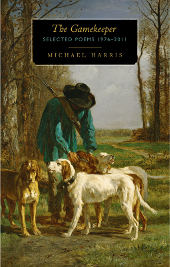The Porcupine's Quill
Celebrating forty years on the Main Street
of Erin Village, Wellington County
BOOKS IN PRINT
The Gamekeeper by Michael Harris
Michael Harris’s first poetry collection since his Governor General’s Award-nominated Circus (2010), The Gamekeeper assembles a thoughtful selection of the Montreal poet’s accomplished verse. With evocative imagery and a natural sense of rhythm, Harris writes of illness, pain, marriage, death, imaginary fairy-tale monsters, and much else. The result, according to one reviewer, "straddles a position between the carnivalesque and the sensual."
In The Gamekeeper, Michael Harris presents poems of sorrow, sensuality, quirkiness and humour—a grand variety of takes on the mortal landscape.
With sharp wit and unaffected music, Harris handles the human and natural worlds with equal sensitivity. Of an apple tree, for instance, he says, "and the apple tree’s victory stays / stiff-necked, full of thrash / in its iron-bare head of black antler." Considering Emily Dickinson in a poem entitled "Death," we are drawn into the protagonist’s world with "Weathered billet-doux hang pinned / in the sheen of black crepe // that encloses her looking-glass / like a wreath of wet seaweed."
The Gamekeeper contains a selection of poetry spanning five collections and over four decades, revealing the full range of one of the finest poets of his generation.
Review text
Harris’s poems zero in on poignant moments with vibrant attention to detail.
In his poem ‘Killing the Beast’, Michael Harris writes, ‘I wanted to slow it all down enough to look at.’ That urge to look closely, to relate every detail of a single, fully realized moment, informs the poems in this collection, as well as some of the paintings that inspired them—at least, according to Harris. Reminiscent of Robert Frost’s work in their measured lines and formal strength, the collection’s poems display an invigorating use of similes and a deft understanding of long, narrative styles.
The volume brings together selections from Harris’s previous five books. The strongest poems arguably come in the first three volumes, which are metrically tight and lit with powerful, visceral images. Of particular power is a long, sectioned poem about the death of the poet’s brother. It moves between childhood and adulthood, memories of living and memories of death, with details such as of the brother’s stutter: ‘the long consistent unstoppable sibilants / esses upon esses.’ The poem’s language enacts the painful interim before the brother finally makes his exclamation. Harris zeros in on such moments with vibrant attention to detail.
In other poems, nature, and humankind’s interaction with it, centers lines. It is their lyrical, lilting language that makes these poems worth engaging, such as around the last apples of fall, when ‘October’s // sweet rot ciders the air.’ Unexpected but apt word choices spark the work.
The later work shows more humor and more interest in the greater world. A series of ekphrastic poems based on famous paintings are included alongside persona poems from a wide variety of speakers. These poems formally play with rhymes and inherited forms, if they lack the same concentrated power of the early work. The Gamekeeper rewards those who value both attentive technical poetry and luxurious images.
—Camille-Yvette Welsch, Foreword Reviews
Review quote
‘Michael Harris ... is a poet of tremendous exactitude.’
—Nicholas Bradley, Canadian Literature
Review quote
‘A great deal of the writing in [The Gamekeeper] fits comfortably in the mainstream tradition of the personal lyric and shows Harris to be a poet of his time. When Harris goes travelling, he writes about travel. When he goes to an art gallery, he writes about paintings. When he becomes a parent, he writes about his children. The impulse toward this kind of poetry is perfectly natural....
‘Other poems in The Gamekeeper, however, show a very different poet: one looking for alternatives to accepted modes and often trying to adapt the lyric voice to different ends. Indeed, one of the most fascinating parts of reading The Gamekeeper is watching Harris move restlessly inside the conventions of lyric, pushing at the edges, attempting to branch out. One can hear him repeatedly ask himself: What can lyric poetry do? How far can its voice be stretched before it snaps?
—Brooke Clark, The Walrus
Excerpt from book
The Cupboard Is Bare
i.m. A.C.
We have gone into the poet’s house and found the kitchen bare.
Not a mouse-turd of comma, not one peppercorn full-stop.
He is bankrupt of the wherewithal to hear the penne drop.
Gone the moths that flew like muses when he burned the midnight oil.
Gone the sunlit daily bread of books on the windowsill,
the tongue-loosening whisky of company come for a meal.
Gone the bouillabaisse of gossip. The manly meat of talk.
Not a simile left to dog us, nor any metaphoric cat. All his passion
cobwebbed in the corner. All our pleasure dust on the floor.
Elsewhere midwives tend to their glistening aubergines;
jewellers’ pomegranates gleam in a ruby of grenadine.
Cauliflowers blanch under the neurosurgeons’ care: but here—
not a fork to poke nor a knife to slice nor a cleaver to cut things out.
Not a skewer in the drawer to string them back together.
Not a draught of thought left anywhere
but it’s gone down the kitchen sink.
Gone back to Scotland, to cold rock and bare hill
and pibrochs full and emptier than the grave.
The table’s an empty altar
with its supplicant of chair,
when the cupboard is bare.
Born in Glasgow Scotland and raised in Montreal, Michael Harris has enjoyed a varied career as an author, editor and educator. He has taught English and Creative Writing at McGill, Concordia, and Dawson College, and spent twenty years as poetry editor of the Véhicule Press imprint Signal Editions. He is the author of several well-regarded poetry collections, including Circus (2010), which was nominated for the Governor General’s Award for Poetry. His works of poetry and prose have been published in leading journals and magazines across North America. Harris’s most recent book is Field Notes: Prose Pieces 1969 - 2012 (2013). He lives in Montreal, Quebec.
The Porcupine's Quill would like to acknowledge the support of the Ontario Arts Council and the Canada Council for the Arts for our publishing program. The financial support of the Government of Canada through the Canada Book Fund (CBF) is also gratefully acknowledged.







